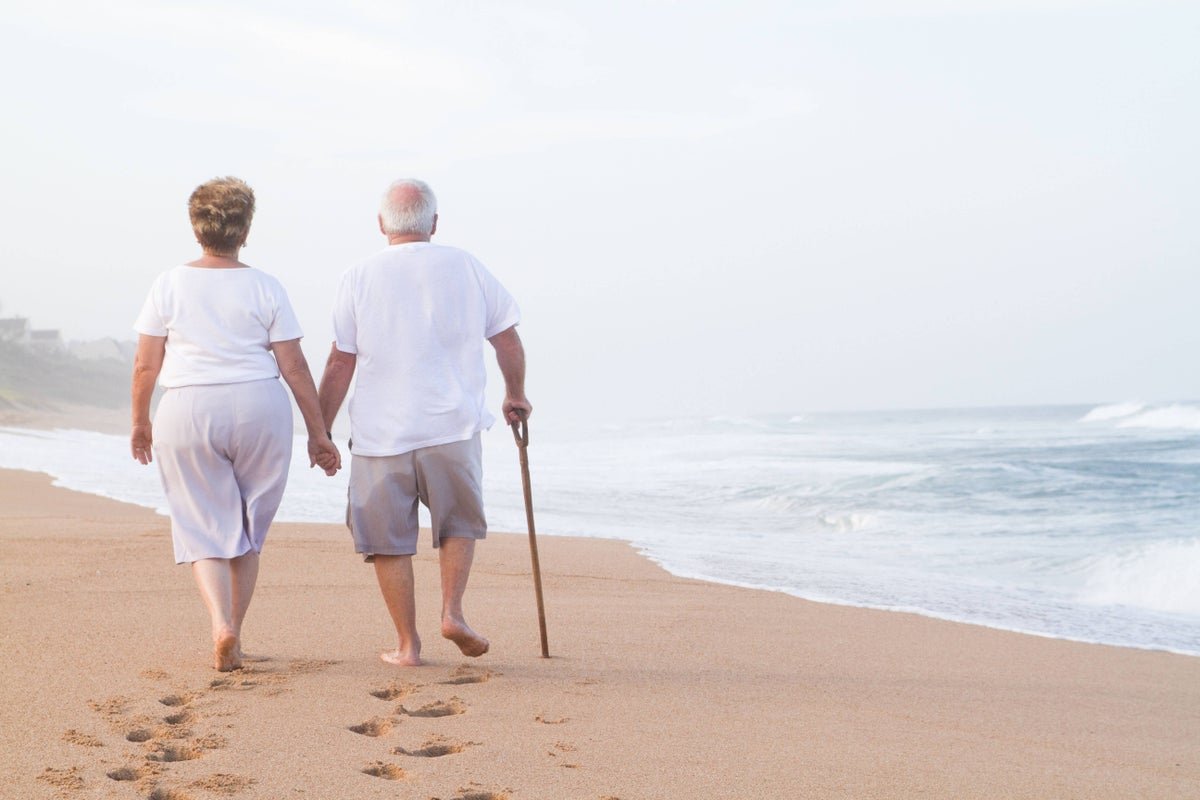Summer has arrived at last, and with rising temperatures, you might be thinking about heading to the nation’s favourite warm-weather spot: the beach.
While a day by the sea can do wonders for both body and mind, it also presents some specific safety challenges for older adults. From managing heat exposure to navigating uneven terrain, a little preparation can go a long way.
Whether you’re planning a seaside stroll or a full day by the shore, here is some advice from Caroline Abrahams, charity director at Age UK, that will help you make the most of your beach outings this summer…
What are the most common risks seniors face at the beach?
Many of us head to the beach with a desire to come back home with a golden sun-kissed tan, but being careful is key, as spending too much time in the sun can lead to heatstroke and dehydration.
“Heat exhaustion and heatstroke due to prolonged sun exposure are common risks for older adults, and dehydration can also become a higher risk due to natural ageing and potential medications like diuretics,” explains Abrahams. “Overexertion or dehydration can also cause confusion or fainting.
“In addition, thinner skin makes seniors more susceptible to sunburn.”
Furthermore, older adults are more prone to falls and injuries at the beach.
“Uneven sand, rocks, and waves can increase the risk of falls,” points out Abrahams. “Plus, some medication and health issues can make you more susceptible to heat, so check with your pharmacist/GP or medication information and cover up accordingly.”
How can seniors prepare for a day at the beach?
Whether you prefer a sandy or pebbly beach, remember to pack all the essentials.
“Pack sunscreen (SPF 30 or higher), wide-brimmed hats, sunglasses, water, snacks, medications and a charged mobile phone,” recommends Abrahams. “Light-coloured, breathable clothing will help you stay cool and keep you protected from UV rays.”
Choosing comfortable seating can greatly improve your seaside experience – and your back will appreciate it later.
“Bring chairs or find other seating on the beach which may be more comfortable, and bring an umbrella or beach tent for shade,” recommends Abrahams.
What are the best times of day for seniors to visit the beach?
“Try to go in the early morning (before 11am) or late afternoon (after 3pm) when the sun is less intense,” advises Abrahams. “Avoid peak sun hours (11am to 3pm) to reduce UV exposure and overheating risk.”
What factors should you consider when choosing a beach to go to?
If you are planning a beach day with the family, try to pick somewhere that is accessible and has good facilities.
“Look for ramps, paths, and nearby parking and ensure that toilets, showers and shaded areas are available,” suggests Abrahams.
Also, check the terrain and find out how calm the waters are.
“Look for a beach with smooth sand without rocks or sharp shells,” recommends Abrahams. “Beaches with lifeguards and gentle waves also tend to be safer.”
What precautions should seniors take to avoid heat exhaustion or sunburn?
View this post on Instagram
“Use umbrellas or sit in shaded seating and reapply sunscreen every two hours or after swimming,” advises Abrahams. “Wear UV-protective clothing such as long sleeves and a wide-brimmed hat.”
And remember, hydration is key!
“Signs of dehydration include a dry mouth, dark urine, a headache, or confusion,” lists Abrahams. “So, drink water frequently, even if you are not thirsty, but drink water in small amounts frequently rather than large quantities at once.”
The charity director also emphasises the importance of learning the symptoms of heat stroke and heat exhaustion, so you can keep an eye out for them in the future.
“Heat-related symptoms include dizziness, nausea, confusion, or excessive sweating,” highlights Abrahams.
What kind of footwear or assistive gear is best for seniors walking on sand or in water?
Abrahams suggests investing in a good pair of supportive sandals, which attain non-slip soles and adjustable straps.”Walking sticks or canes may also help you on uneven ground,” adds the charity director.
She also recommends wearing some water shoes if you are keen to have a paddle in the sea.
“Water shoes will protect you against sharp objects and provide stability,” says Abrahams.
How can seniors enjoy the sea safely?
“Always swim at life-guarded beaches and avoid strong currents, and never swim alone – or let someone know you are going,” advises Abrahams. “Also, use flotation devices or hold onto railings if available.”
Plus, remember that acclimatising to water temperature is crucial for safe and enjoyable swimming.
“Gradually acclimatise to water temperature to avoid shock,” says Abrahams.
#enjoy #beach #safely #senior #summer



